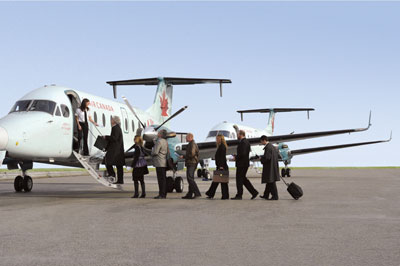
News
On Final: Standing up for safety
The time has come for all commercial aviation operators to implement Safety Management Systems (SMS).
October 31, 2012 By John McKenna
The time has come for all commercial aviation operators to implement Safety Management Systems (SMS).
 |
|
| SMS would yield even greater efficiency and cost savings through reduced incidents and avoidable accidents. Photo: Air Georgian
|
Canada’s larger commercial carriers have been required to have fully implemented SMS in their operations since 2005. Yes, the cost of implementation has been significant, as would be that of any quality control system. But time has proven that the savings have far outweighed the cost incurred by operators. Few, if any, of Canada’s 705 operators would do without SMS today as they appreciate the benefits gained from their investment, both financially and in terms of safety.
The Air Transport Association of Canada (ATAC) strongly defends that SMS is an investment in a safety culture and it’s a business model that benefits everyone involved. SMS is a safety culture synonymous with prevention, empowerment, communication, involvement, awareness, continuous improvement and appropriate actions.
The fact remains, smaller operators are as safety conscious as larger ones. But they must now invest in structuring their safety culture in their day-to-day operations in a manner that allows Transport Canada (TC) to effectively monitor their practices. Smaller carriers already invest heavily in safety by keeping their fleets safe and by continuously training personnel, but SMS would yield even greater efficiency and cost savings through reduced incidents and avoidable accidents.
Many 705 operators who hold other operating certificates that are not yet regulated to be SMS compliant have nonetheless implemented SMS throughout their operations. Unfortunately, a great number of operators in the 406, 702, 703 and 704 communities aren’t yet SMS compliant and won’t venture into SMS until they get a clear message from Ottawa as to what exactly is expected of them. For far too long, these operators have been getting mixed messages from TC on their eventual obligation to comply with SMS. They have grown weary and skeptical of Ottawa’s conviction and support of SMS for the smaller operator.
The latest Transportation Safety Board Report offers an irrefutable argument in support of an industry-wide implementation of SMS. However, the transition to SMS will certainly be very challenging for smaller operators. These operators have fewer management personnel and, in many cases, they fly in more hostile regions, have older aircraft and less experienced crews. This alone warrants a made-to-measure SMS to reflect such a reality.
ATAC has recognized this from the outset and has lobbied TC to accept that SMS can only be implemented in smaller operations if the SMS requirements are commensurate to the size and complexities of such operations. We are now convinced that TC and its regional personnel fully recognize this essential condition; this is the only way SMS compliance by smaller operators is going to be successful or even possible.
Consequently, ATAC has invested in developing an SMS Toolkit that supports the regulatory requirements and reflects the reality of smaller operations. ATAC’s policy is to promote SMS and its objective is to facilitate Canadian air operators’ implementation of an SMS appropriate to the size and complexity of their operation in compliance with the CARs. The ATAC Tool Kit and Guide accomplishes this and is available free of charge to all ATAC members.
Safety is not a question of size but of commitment. Everyone in Canada’s aviation community is clearly focused on safety but there has to be one standard for all sectors. Yes, the management of safety will differ from one operator to the next depending on size and type, but the practices and the safety culture must be set and verifiable according to common standards.
We ask that without further delay the Minister of Transport set April 1, 2014 as the date for SMS implementation for all operators not currently regulated to have SMS. This firm deadline would allow the regulator sufficient time to refine procedures, training and guidance material, and would give industry time to transition from their current quality control mechanisms to SMS.
TC already oversees all commercial operations in Canada. Surely, the proposed deadline would give the department ample time to review its auditing process and procedures in order to offer an SMS compliant industry the oversight service it requires. Setting a firm compliance date now would send an even stronger message to the travelling public and to industry that Ottawa expects all carriers be subjected to the same safety requirements.| W

|
|
John McKenna is the president/CEO of the Air Transport Association of Canada (ATAC).